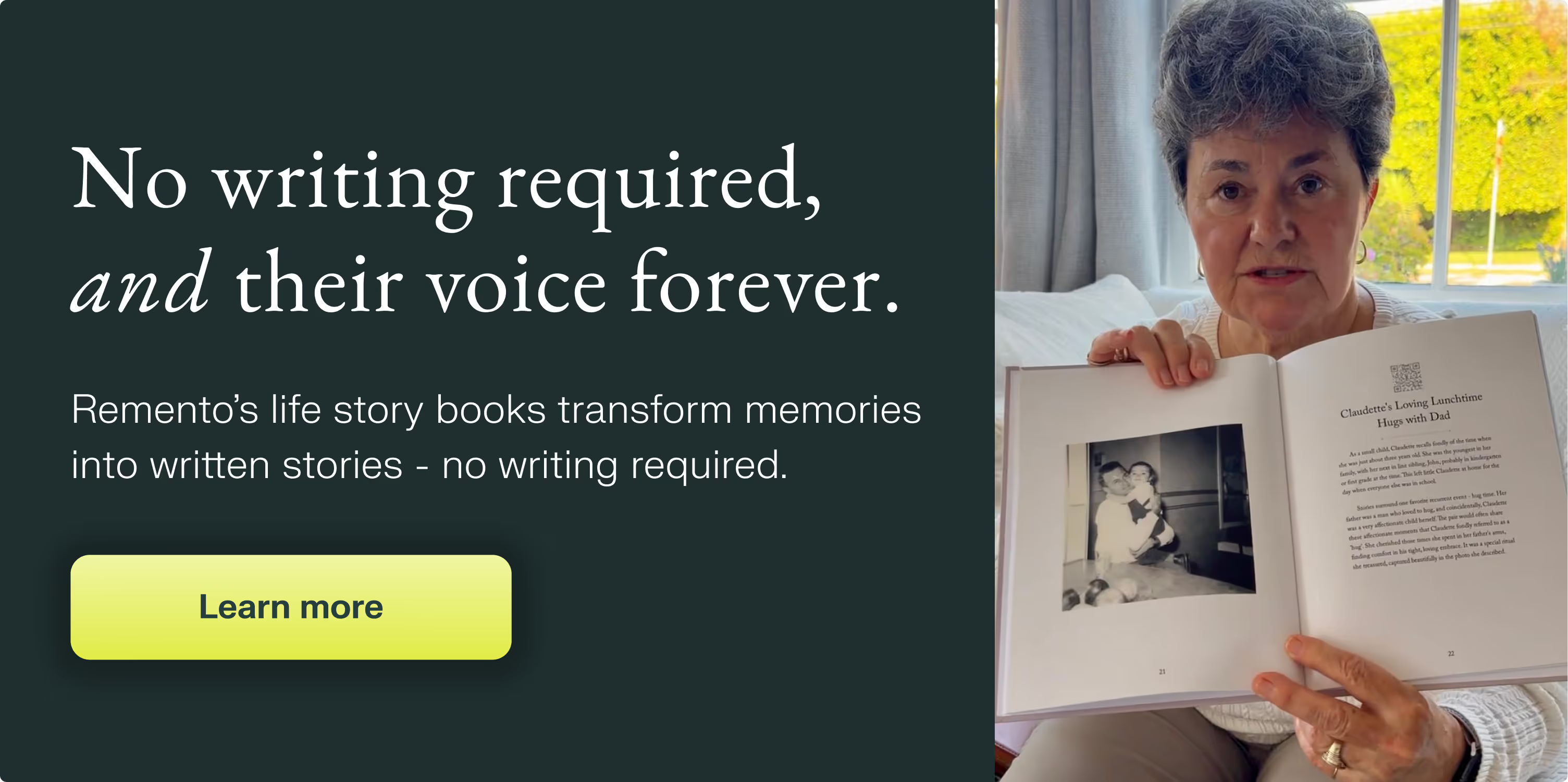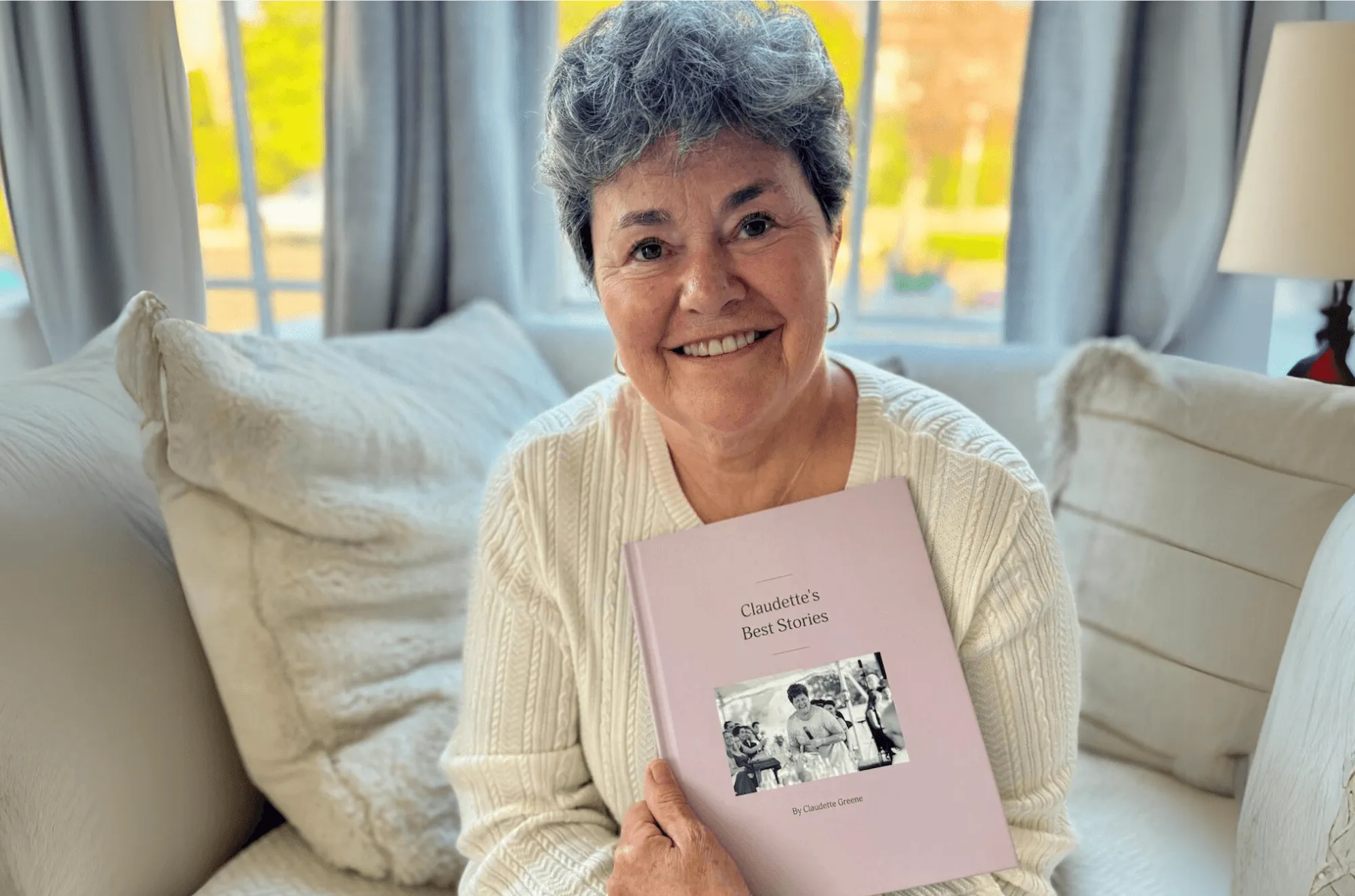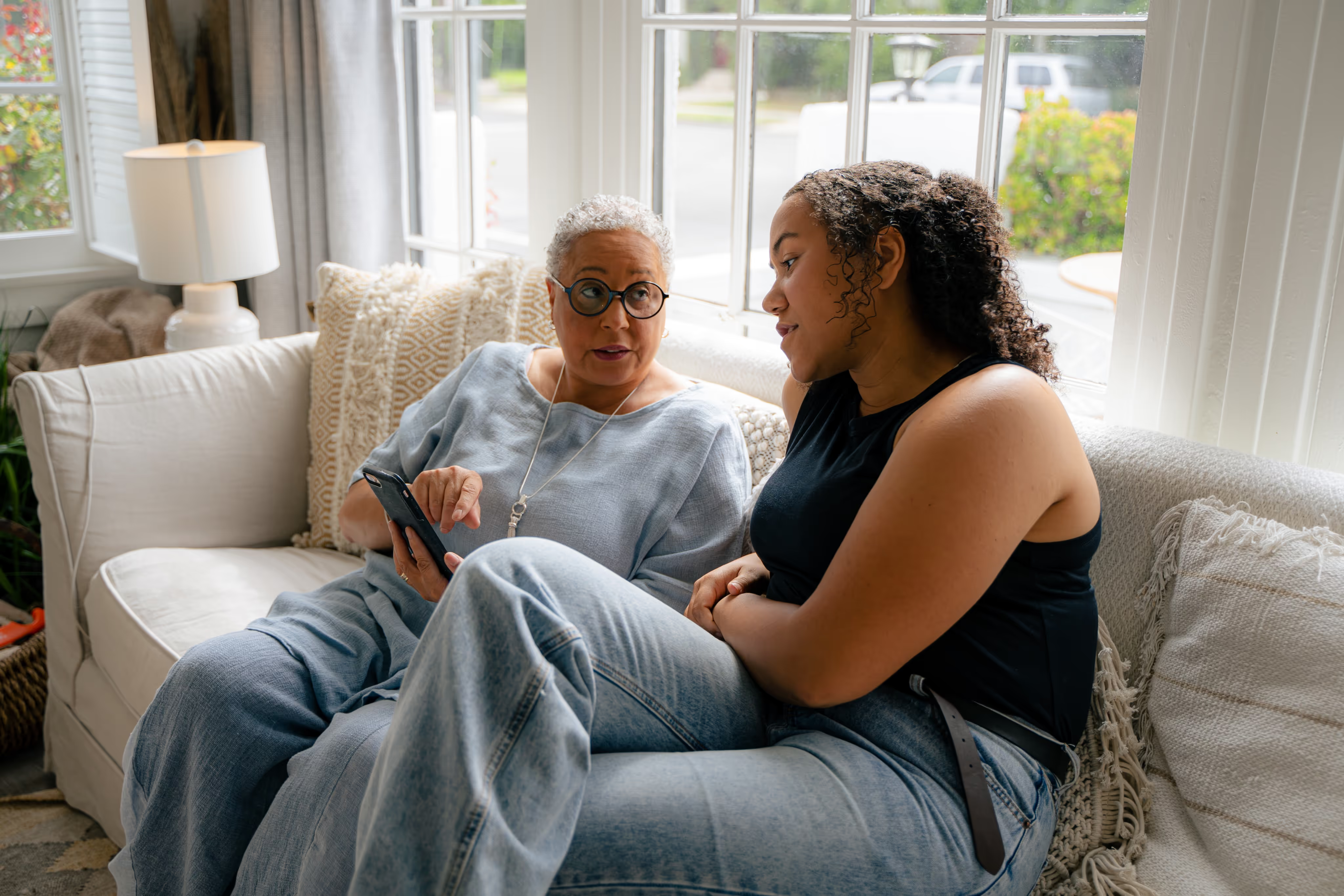Guaranteed to teach you things you never knew.
Capturing a Father's Legacy in the Face of Alzheimer's with Remento: Jennifer’s Remento Review
When Jennifer's father was diagnosed with Alzheimer's, capturing his stories through Remento not only helped preserve his memories but also deepened family connections, bringing joy and discovery to their shared journey.
When Jennifer H.'s father was diagnosed with Alzheimer's, her family faced a challenge familiar to many: how to preserve the precious memories and stories that make up a lifetime before they fade away. What began as a practical solution to a heart-wrenching problem soon evolved into something much more profound - a journey of discovery, connection, and unexpected joy that has touched every member of their family.
Using Remento to Document The Memories of Someone Living with Alzheimer's
When Jennifer's father was diagnosed with Alzheimer's, the family knew they needed to act quickly to preserve his memories. The decision to use Remento was driven by several factors. First, the platform's ease of use was crucial, given her father's condition. The ability to simply speak and have stories recorded was far more accessible than asking him to write memoirs.
Moreover, the structured approach of weekly prompts appealed to the family and their goal of creating a resource they could use to help stimulate her father's memory as his condition progressed.
Lastly, the collaborative nature of the platform, allowing multiple family members to participate in the process, was appealing. It meant that preserving these memories could become a family project, bringing them closer together during a challenging time.
Learn more: Using Remento to Unlock the Benefits of Storytelling For People with Dementia
Exploring the Memories of Someone With Dementia
What started as a way to preserve her father's memories quickly became a journey of discovery for her entire family. Jennifer was surprised to find herself learning new things about her father's life, even after years of close relationship.
"Some of the things he's talking about I never knew about. My mom was sitting in the office listening to him record and said, 'I never heard that before.'"
This experience highlighted how even the closest families can have undiscovered chapters in their shared history. The structured yet natural way of exploring these hidden gems allowed their family to learn more about their loved ones and their past. It's not just about preserving facts and dates, but about understanding the experiences that shaped their family's journey.
The Power of Reminiscing for Those Living With Alzheimer's
For Jennifer's father, the process of sharing his stories became a source of great joy and excitement. His enthusiasm for the storytelling process has been a unexpected bright spot in their Alzheimer's journey. Jennifer describes his excitement:
"He is like a kid at Christmas. Every time he gets one of the emails he runs to the computer. And then he talks about it for the next two days and asks for more prompts."
This excitement has not only brought happiness to her father but also created a renewed sense of connection within the family. It's a powerful reminder of how sharing our stories can bring us closer together, regardless of age or circumstances. For Jennifer and her family, it's become a way to engage with her father in a meaningful way, focusing on the wealth of memories he still holds.
Using Photos to Spark Memories
One aspect that has been particularly effective for Jennifer's father is the use of photographs to prompt stories. Visual cues have proven to be powerful tools in evoking memories, especially for someone dealing with cognitive challenges.
"I love that you can send a picture and just say, 'Can you tell me about this picture?' And then you can see his face light up while he's remembering it. It's like the photo unlocks a door to a room full of memories."
This visual approach has proven especially powerful in evoking not just memories, but the emotions associated with them. For someone facing memory challenges, these visual cues can be invaluable in accessing and sharing life experiences.
Learn more: Ways to Use the Power of Photos for Dementia Care
Jennifer has found that even photos her father hasn't seen in years can spark detailed recollections, bringing to life moments from the past that might otherwise have been lost.
A New Way to Engage Family After an Alzheimer's Diagnosis
What started as a project focused on Jennifer's father has evolved into a shared experience for the entire family.
"It's nice that my brother and mom can watch the stories and we can all put in prompts together," Jennifer says. This collaborative approach has allowed multiple generations to participate in the storytelling process, ensuring that the stories captured are meaningful to everyone involved.

With Remento, Jennifer has recruited her brother and mother to help pick photos and customize questions for her dad. Plus, as a collaborator with Remento, each of them receives an update when a new story is recorded and can easily send a reaction.
Creating a Lasting Legacy
For the her family, dealing with an Alzheimer's diagnosis has given this project a sense of urgency. They're acutely aware that they're in a race against time to capture as many memories as possible while her father is still able to share them.
"We want to preserve some memories that we can play back for him when he's not remembering to jar his memory."
This approach not only helps in preserving memories for the future but also provides cognitive stimulation in the present. The act of recalling and sharing stories has become a form of mental exercise that's both enjoyable and meaningful for Jennifer's father.
This approach not only helps in preserving memories for the future but also provides cognitive stimulation in the present. The act of recalling and sharing stories has become a form of mental exercise that's both enjoyable and meaningful for Jennifer's father. It gives him a sense of purpose and allows him to contribute to the family in a meaningful way, despite the challenges of his condition.
"He looks forward to remembering these stories each week, and we're not sure how long that will last," Jennifer shares, underlining the importance of capturing these memories while they're still accessible. "Every story feels like a gift, something we might not have had if we hadn't started this process."
Unexpected Benefits of Creating a Life Story Book For Someone With Alzheimer's
One surprising outcome has been the frequency with which Jennifer's father wants to share his stories. What started as a weekly activity has become an almost daily occurrence, driven by her father's enthusiasm.
"He's so excited that he wants to do it every day. We're doing a lot more than one story per week because dad is enjoying it so much," Jennifer says with a smile in her voice. "It's become a part of his routine, something he looks forward to each day."
This enthusiasm has not only resulted in a richer collection of stories but also provided her father with a sense of purpose and engagement that's especially valuable given his diagnosis. It's given structure to his days and a way for him to feel productive and valued.
A Journey of Discovery
What started as a way to preserve her father's memories has turned into a journey of discovery for the entire family. They've uncovered family stories they'd never heard before, gained new insights into their shared history, and developed a deeper appreciation for their father's life experiences.
"So it's not just for us. It's very much for him as well. And we're all going on this journey together. It's nice to watch him light up and then to hear the stories and then to see it in print."
This shared experience has brought new depth to their family relationships, allowing them to connect over shared memories and discover new aspects of their family history. It's given them a way to engage with their father's past in a way that feels meaningful and immediate, rather than distant or academic.
Looking to the Future
While digital content has its benefits, Jennifer appreciates having tangible reminders of these stories. "Digital content is great, but it's nice to have something you can hold in your hands," she reflects. The family is looking forward to having physical books that compile these stories, something they can keep on their shelves and pass down through generations.
For their family, this journey of storytelling has become about more than just preserving memories. It's about strengthening family bonds, discovering untold stories, and creating a lasting legacy for future generations. In the face of a challenging diagnosis, they've found a way to celebrate their father's life and ensure that his stories will continue to be shared for years to come.
"I think about my kids, and their kids someday," Jennifer explains. "They'll be able to hear these stories in their grandfather's own voice, to see his expressions and hear his laugh. That's something really special."
As they continue on this journey, the family is grateful for the unexpected gifts it has brought them - closer family ties, a treasure trove of memories, and precious time spent with their father, recording the stories that have shaped their family.

Their stories, forever at your fingertips
Remento’s life story books turn a parent or grandparent’s memories of the past into a keepsake book for the future - no writing required,.
Capture priceless family memories today
Join the thousands of families using Remento to preserve family history, all without writing a word.
.avif)
.avif)
